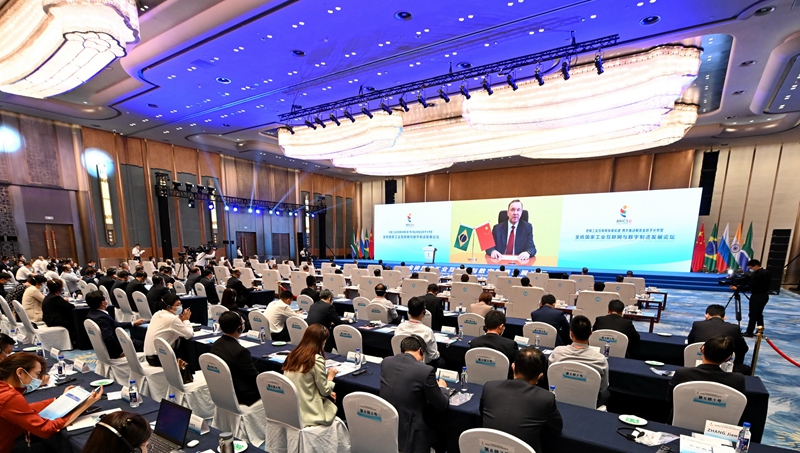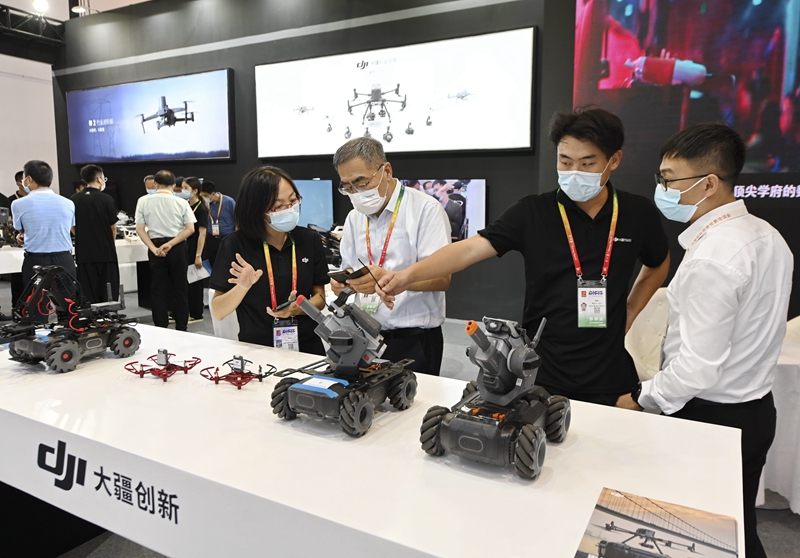
The BRICS Forum on Development of Industrial Internet and Digital Manufacturing takes place in Xiamen, Fujian Province, on May 23 (XINHUA)
Chinese consumer electronics giant TCL Technology Group Corp. has expanded its overseas factories making televisions, display modules and photovoltaic cells in countries including India and Viet Nam. The company has also established joint ventures with local partners in Brazil to build production bases, supply chains and a research and development (R&D) system, according to Li Dongsheng, founder and chairman of the company. He made the remarks at the opening ceremony of the BRICS Forum on Development of Industrial Internet and Digital Manufacturing, which took place in Xiamen, Fujian Province, on May 23.
This is one of many examples of deeper BRICS cooperation in recent years. BRICS is the acronym for an emerging-market bloc that groups Brazil, Russia, India, China and South Africa. According to a report released by the China Science and Technology Exchange Center, the export value of hi-tech products from the five countries was $6 trillion in 2020 and accounted for over 25 percent of the global total.
Representing 40 percent of the world's population, development has long been a key priority for BRICS nations. Data from Statista, a global business data platform, showed that they secured a combined GDP of over $23.5 trillion in 2021, accounting for more than 25 percent of the world economy.
The BRICS countries need to "firm up belief, brave the storms and waves, and take real action to promote peace and development, uphold fairness and justice, and advocate democracy and freedom, so as to inject stability and positive energy into international relations in a period of turbulence and transformation," Chinese President Xi Jinping said while delivering a video address at the opening session of the BRICS Foreign Ministers' Meeting on May 19.
Deepening collaboration
The meeting was chaired by Chinese State Councilor and Foreign Minister Wang Yi. According to Wang, since China took over the BRICS chairmanship at the beginning of this year, more than 50 important events have been held, pushing the BRICS cooperation to achieve significant progress in multiple fields and laying a solid foundation for the 14th BRICS Summit to be held in June.
China has been working with BRICS partners to consolidate the cooperation architecture in economic, political, security, and people-to-people exchange fields, and build a partnership that is closer and more practical. These efforts include launching the BRICS Partnership on New Industrial Revolution Innovation Center to implement joint programs, building the Chinese national center of the BRICS Vaccine R&D Center to narrow the vaccination gap, and hosting the BRICS Seminar on Governance and Cultural Exchange Forum to enhance mutual learning.
Andrey Gubin, a professor of international relations at Russia's Far Eastern Federal University, said for the BRICS nations, "there are no goals of confrontation and containment, but only the logic of promoting each other's development."
The BRICS mechanism will "make it possible to focus on the problems of uneven development, depletion of resources, environmental degradation, climate change, and the spread of dangerous diseases, which must be dealt with only by the efforts of the world community," he added.
For example, the New Development Bank, a lender established by the BRICS nations, has approved loans for more than 80 projects of its members since its establishment, covering sectors including transport, water and sanitation, clean energy, digital infrastructure, social infrastructure and urban development.
In his remarks, Xi called on the five members to strengthen security cooperation in the face of increasing instability, uncertainty and insecurity across the world.
The Global Security Initiative recently proposed by Xi, which "addresses the issues of peace deficit and governance deficit, and seeks peace and development," will certainly find its currency in developing countries, B. R. Deepak, Chairperson of the Center for Chinese and Southeast Asian Studies at the New Delhi-based Jawaharlal Nehru University, told Xinhua News Agency.

Visitors at the booth of Chinese drone manufacturer DJI during the BRICS Exhibition on the New Industrial Revolution in Xiamen on September 8, 2021 (XINHUA)
Open and inclusive
At the meeting, the foreign ministers agreed to expand the BRICS membership, stressing that the bloc's strength lies in its diversity and representation. China proposed to study the standards and procedures for the expansion and gradually form a consensus.
"This shows that BRICS cooperation is open and inclusive, its members hope to deepen cooperation with other emerging markets and developing countries, and the appeal of the mechanism is constantly increasing," Wang Wenbin, a Chinese Foreign Ministry spokesperson, said.
The mechanism can bring tangible benefits to new members, including public goods, investment and financing support, as well as cooperation with the existing members on vaccines and public health, according to Bu Shaohua, a researcher with China Institute of International Studies. In addition, the expansion of membership can help raise the voice of developing countries in global governance, Bu said.
Wang Yiwei, Director of the Institute of International Affairs at the Renmin University of China, suggests that other developing members of the Group of 20 (G20) that are interested in the BRICS membership should be considered first in the process.
Indonesia, for instance, as a strong representative of emerging market economies and the largest Muslim country by population, is likely to be a potential candidate, he told the Global Times.
Argentina, one of the G20 nations, is looking forward to closer coordination with the BRICS countries, according to its Foreign Minister Santiago Cafiero.
Including new members could better underpin the organization's positive role in addressing international affairs and offset the negative impact of some countries' attempts to intensify geopolitical confrontation and reverse globalization by forming political blocs, said Song Guoyou, Deputy Director of the Center for American Studies at Shanghai-based Fudan University.
BRICS Plus
On the sidelines of their meeting, the BRICS foreign ministers also attended a dialogue with foreign ministers or their representatives from Argentina, Egypt, Indonesia, Kazakhstan, Nigeria, the United Arab Emirates, Saudi Arabia, Senegal and Thailand. The event took place under the BRICS Plus cooperation format, which was put forward by Xi five years ago as a platform for cooperation and development among emerging markets and developing countries.
Luis Antonio Paulino, a professor at Sao Paulo State University, told Xinhua that the BRICS countries, as Xi has stressed, need to strengthen mutual political trust and security cooperation, and engage in dialogue and exchanges with more emerging markets and developing countries.
"These efforts will also strengthen the forces for peace, progress and development," echoed Wang Lei, Director of the Center for BRICS Cooperation Studies at Beijing Normal University.
"We should make good use of the cooperation model, welcome more countries to participate and work together to promote democracy in international relations, inclusiveness in the world economy and justice in global governance, and jointly create bright prospects and a bright future," Wang Yi concluded.
















